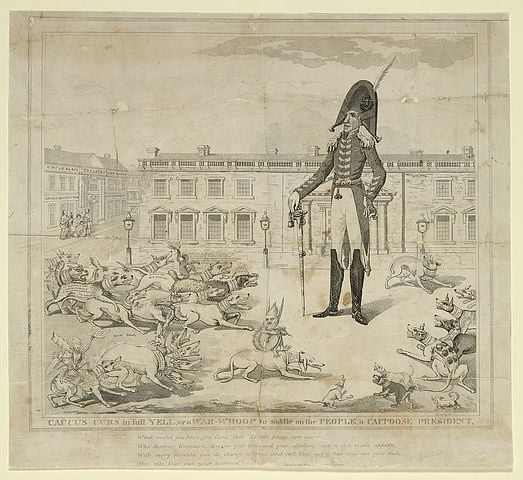*Image Credit: Wikimedia Commons Political battles are frequently close calls and, in the United States, only one presidential election has not been decided by the voters themselves — the battle between John Quincy Adams, Andrew Jackson, William H. Crawford and Henry Clay. With none of the four candidates able to secure a majority of the electoral vote, the United States House of Representatives convened to decide the winner on December 1, 1824. Twenty years before, the Constitution of the United States had been altered to reflect a new means of deciding how the Electoral College would work. The Founding Fathers had designed the process to work as a republic — eligible persons would cast one vote for the candidate of their choice, then representatives from each state would cast their ballots in the Electoral College. According to the Twelfth Amendment, passed in 1804, a majority of the votes cast in any one year would determine the President and Vice President. In the event no one managed to garner more than half, the House of Representatives would hold a special session to choose from the three highest totals. For the Election of 1824, four men had run campaigns for the highest office in the land: Andrew Jackson, a Senator from Tennessee; John Quincy Adams, the Secretary of State; William H. Crawford, the Secretary of the Treasury; Henry Clay, a Representative from Kentucky. Each representing the Democratic-Republican Party — the last time a unified political organization would exist in the campaign for President — none of the men were able to receive the necessary 131 of 261 votes in the Electoral College to win the race. Jackson had received the most (99) followed by Adams and Crawford. When the House of Representatives met on December 1, 1824 to begin the process of selecting a President per the procedure outlined two decades before, Clay was left out of the debate. However, owing to his position as Speaker of the House, he would remain influential over the next two months. At the official vote on February 9, 1825, Adams claimed 13 states, Jackson 7 and Crawford 4. Clay would go on to receive an appointment as the Secretary of State after helping to sway his fellow politicians to back Adams. Furious, Jackson and his colleagues cried foul — they accused the man from Kentucky of a “corrupt bargain,” a charge that would tarnish his reputation for years to come. (Clay, for his part, merely believed he and Adams agreed more on the direction to take the country as it expanded to the west.) Though rightfully defined as the only presidential contest to date to require an intervention according to the exceptions outlined in the Twelfth Amendment, the Election of 1804 is quite notable for the result four years later: distinct parties challenged each other for the first time. Adams, the incumbent and representative of the National Republican Party, would lose to Jackson from the Democratic Party. Also On This Day: 1420 – Henry V of England enters Paris 1640 – The Iberian Union, in which the monarchies of Spain and Portugal were united, comes to an end 1913 – Ford Motor Company introduces the first moving assembly line 1955 – Rosa Parks refuses to give up her seat and is arrested by police in Montgomery, Alabama for violating segregation laws 1991 – Ukrainian citizens vote in favor of independence from the Soviet Union 1st December, 1953 – Hugh Hefner publishes 1st edition of Playboy magazine, featuring Marilyn Monroe as the magazine’s 1st centerfold 1st December, 1640 – Portugal regains independence after 60 years of Spanish rule 1st December, 1783 – Jacques Charles & Nicolas Roberts make first untethered ascension with gas hydrogen balloon in Paris 1st December, 1822 – Dom Pedro crowned emperor of Brazil 1st December, 1947 – Don Bradman scores 185 in the 1st Cricket Test v India at the Gabba
December 1 1824 – The United States House of Representatives is Forced to Decide the Presidential Election
*Image Credit: Wikimedia Commons Political battles are frequently close calls and, in the United States, only one presidential election has not been decided by the voters themselves — the battle…
